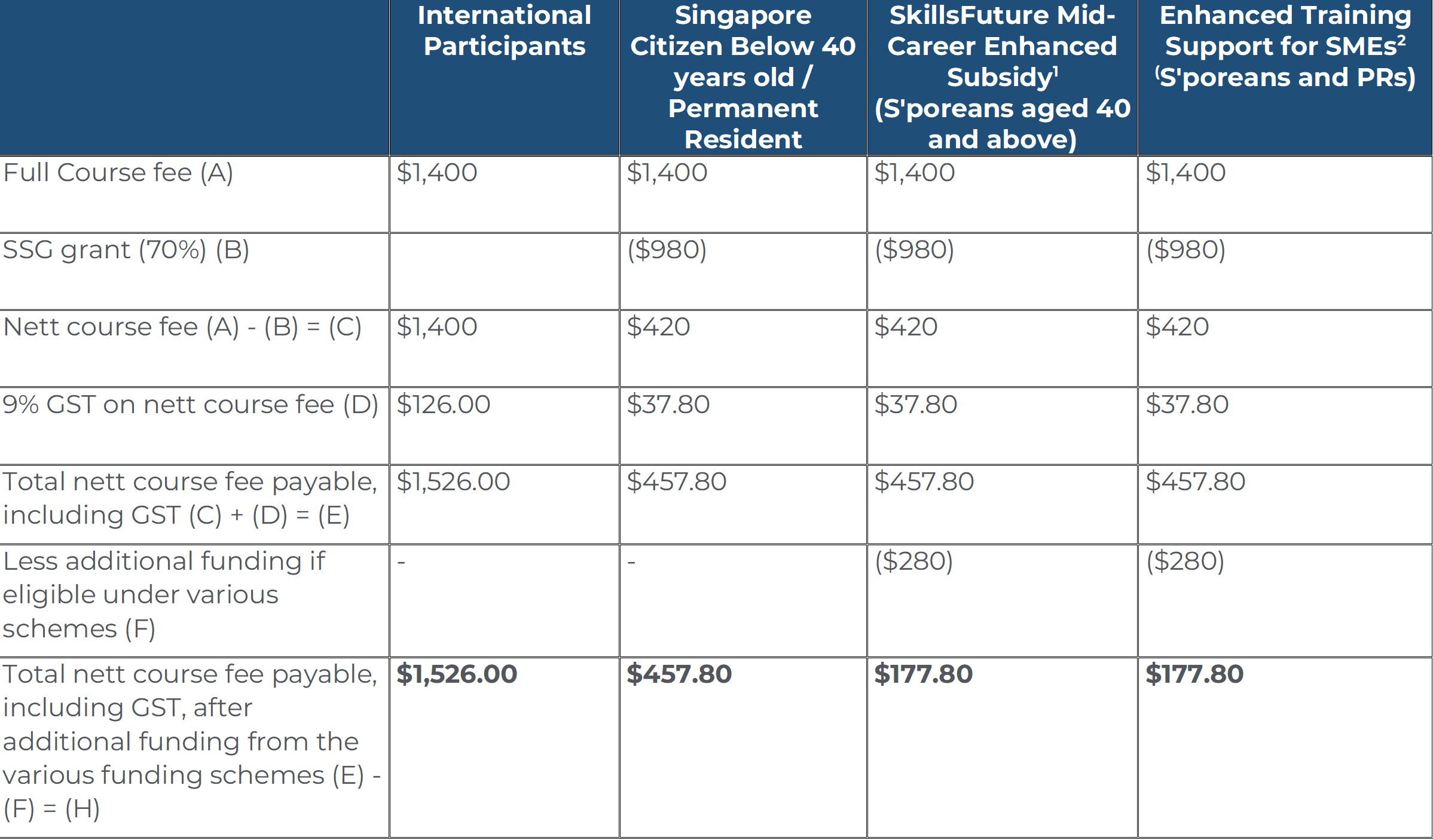Level: Basic
Duration: 2 days
Dates: 12 and 13 September 2024
Venue: Singapore University of Social Sciences
This module covers the theoretical framework of social resilience and crisis management as well as provides strategies for social integration, creative conflict resolution and problem solving. Social resilience may be conceptualized as consisting of individual and personal resilience as well as interpersonal and community resilience. The focus of the workshop is on assessing and building personal and interpersonal social resilience with the integration of case studies and skills development. The application of the concepts of social cohesion and social network, that supports individual and community wellbeing, will be highlighted. The course will also deal with differences and strategies of community development, conflict management to build bridges and channels of social inclusion and social integration.
Social service professionals, community leaders, home team members, social support providers, caregivers and volunteers.
Individual and Personal resilience (4 Hours)
- Concept and Theory of Resilience
- Measure of Personal Resilience
- Principles for building Personal Resilience
- Effective coping and Social support
Relational and Interpersonal resilience (4 hours)
- Concept of Interpersonal resilience and social Capital
- Developing Social support and Network
- Measure of SSN, SSS and Social network analysis
- Social resilience and Crisis response
- Social engagement and interpersonal skills
- Cultural intelligence, interpersonal conflict resolution and problem solving skills
Community and Societal resilience (4 hours)
- Concept of community and societal resilience
- Unity in diversity, recognizing and valuing difference, growing trust and common identity
- Dealing with community conflicts, mediation and conflict management
- Building social solidarity, social inclusion and social cohesion
- How to develop a sense of community?
Focus on integration and application with case studies and skills development (2 hours)
A. Knowledge and Understanding (Theory Component)
By the end of this course, you should be able to:
Assess concepts and theories of social resilience, social capital and social network
Develop principles of building social resilience as applied to crisis situations
Evaluate concepts and principles of community, social inclusion, cohesion,
Apply principles of developing cultural intelligence and conflict resolution framework
B. Key Skills (Practical Component)
By the end of this course, you should be able to:
Assess and build skills personal, interpersonal and community resilience
Develop and utilize interpersonal skills, social network and support systems for crisis intervention
Enhance skills in cultural intelligence, mediation and conflict management, and
Apply skills in responding to crisis, cope and deal with different conflicts and adversities
| Time | Agenda |
|---|
| Day 1 |
| 09:00 - 09:15 | Course Overview |
| 09:15 - 11:15 | Individual and Personal resilience
Concept and Theory of Resilience
-Measure of Personal Resilience |
| 11:15 - 11:30 | Break |
| 11:30 - 13:00 | Principles for building Personal Resilience
-Effective coping and Social support. |
| 13:00 - 14:00 | Lunch |
| 14:00 - 15:30 | Relational and interpersonal resilience
- Concept of Interpersonal resilience and social Capital
- Developing Social support and Network
- Measure of SSN, SSS and Social network analysis |
| 15:45 – 17:15 | Social resilience and Crisis response
- Social engagement and interpersonal skills
- Cultural intelligence, interpersonal conflict resolution and problem solving skills |
| 17:30 – 18:00 | Review and Assessment |
| Day 2 |
| 09:00 – 09:15 | Course Overview |
| 09:15 – 10:45 | Application of Conflict resolution skills (continue)
Community and societal resilience
- Concept of social inclusion, community and societal resilience
- Unity in diversity, recognizing and valuing difference, growing trust and common identity
- Dealing with community conflicts, mediation and conflict management in crisis |
| 10:45 - 11:00 | Break |
| 11:00 - 13:00 | Building social solidarity and social cohesion
- How to develop a sense of community?
- Social support structures and crisis management in community |
| 13:00 - 14:00 | Lunch |
| 14:00 - 16:00 | Case Study, Integration and Application
Course Project Presentations |
| 16:00 – 16:15 | Break
|
| 16:15 - 17:30 | Course summary and assessment of personal, interpersonal and community resilience as applied to Crisis management |
| 17:30 – 18:00 | Final Assessment and Closing Ceremony |
- Individuals Class Assessment
- Group Project & Presentation
- Attendees should have a basic understanding of human relationship and motivation to build social network and support.
- Attendees have to bring along their own laptop.
 Dr Tan Ngoh Tiong
Dr Tan Ngoh Tiong
Dr Tan Ngoh Tiong is Professor and former Dean of S. R. Nathan School of Human Development, Singapore University of Social Sciences and Chair of the Global Institute of Social Work. Prof Tan is currently Treasurer, International Association of Schools of Social Work, President of ConneXions International, past Co-chair of Commonwealth Organization for Social Workers, Past President of Singapore Association of Social Workers, formerly Vice President of International Federation of Social Workers.
He has taught and trained many mental health professionals, social workers and volunteers in Crisis and Disaster Management in Chengdu, China and Davos, Switzerland, as well as online courses and global conference speaker on Social Work and Crisis Intervention, Social Resilience and Mental Health during Covid19 Pandemic, and a keynote speech on the “Value of Social Resilience and Human Relationships for Social Inclusion and Social Development”.
He had served on a number of boards and authored numerous books and scholarly articles including Asian Tsunami and Social Work Practice, Challenge of Social Care in Asia, Extending Frontiers: Social Issues and Social Work in Singapore, Alternative Dispute Resolution, Social Resilience, and Is Singapore a Resilient Society? He recently has a chapter “Social Resilience and Natural Disasters: Effective Social and Community Response to Crisis and Trauma” in a book to be published by Routledge Publisher (in press).
Please submit the following documents to [email protected]:
- Coloured copy (back and front) of NRIC for Singaporeans and PRs, or "Employment"/"S" Pass for foreign applicant
- Application form

1 Mid-Career Enhanced Subsidy: Singaporeans aged 40 and above may enjoy subsidies up to 90% of the course fees.
2 Enhanced Training Support for SMEs: SME-sponsored employees (Singaporean Citizens and PRs) aged 21 and above may enjoy subsidies up to 90% of the course fees.
- Participants are required to achieve at least 75% attendance and pass any prescribed examinations/assessments or submit any course/project work (if any) under the course requirement.
- Participants are required to complete all surveys and feedbacks related to the course
- The course fees are reviewed annually and may be revised. The University reserves the right to adjust the course fees without prior notice.
- Singapore University of Social Sciences reserves the right to amend and/or revise the above schedule without prior notice
For clarification, please contact the SUSS Academy via the following:
Telephone: +65 6248 0263
Email:
[email protected]